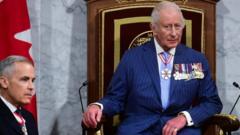King Charles III's recent Throne Speech outlines key priorities for Canada, emphasizing national pride, economic transformation, and a commitment to addressing social issues and military readiness.
Canada Charts a Bold Path in King Charles' Throne Speech

Canada Charts a Bold Path in King Charles' Throne Speech
Canada seeks to redefine its identity and respond to global challenges in King Charles' compelling address.
In a historic Throne Speech delivered by King Charles III in Ottawa, Canada is set on a course of reaffirming its sovereignty and solidifying its position in an unpredictable global landscape. The address comes on the heels of April's general election win for the Liberals, led by Prime Minister Mark Carney, who is tasked with navigating the nation through economic and social complexities. Here are five key insights from the King's inspiring speech.
**A Message of Sovereignty Amid US Tensions**
King Charles opened with a patriotic note, firmly establishing Canada's sense of identity against the backdrop of rising tensions with the United States. In what was interpreted as a subtle rebuke to US President Donald Trump, the King noted the significance of Canada's sovereignty, stating that the Crown remains a potent symbol of unity and stability for the nation. He praised the resilience and diversity of Canada, reminding the audience that as "The True North is indeed strong and free," the country is built on strong foundations.
**Facing Global Uncertainty Together**
A central theme of the address was how Canada will address unprecedented global challenges while taking advantage of new opportunities. King Charles referred to shifting dynamics in international trade, emphasizing Canada’s need to deepen ties with European allies amidst evolving relationships elsewhere. The King expressed optimism that Canada is at a pivotal juncture, where it can enact significant economic transformations unparalleled since World War II.
**Economic Growth and Infrastructure Development**
The King robustly addressed critical domestic policies highlighting the Liberal government's strategic plans to boost economic vitality through infrastructure projects. He noted plans to expedite national projects and double funding to facilitate Indigenous participation in major initiatives. Moreover, a commitment to legislative change by mid-year aims to eliminate internal trade barriers costing the nation approximately C$200bn annually.
**Housing Affordability and Crime Initiatives**
Housing has emerged as a crucial issue, with skyrocketing prices leaving many Canadians struggling. To tackle this crisis, Carney's administration intends to double home construction to 500,000 annually. The speech defined commitments to innovate housing solutions, including investments in modular housing and slashing development fees for multi-unit dwellings. Additionally, the King's address outlined tougher laws against crimes like human trafficking and drug smuggling, a promise resonating from the recent campaign.
**Bolstering Defence Commitments**
As military pressures increase from allies, especially the United States, the King reiterated Canada's intent to reach the NATO benchmark spending target of 2% of GDP by 2030. The address included commitments to fortify Canadian military capabilities, strengthen international defense collaborations, and increase Arctic engagement. The prospect of Canada participating in the US-led "Golden Dome" missile defense initiative further underscores this commitment to national security.
In summary, King Charles III's Throne Speech laid out a clear vision for Canada—one that emphasizes self-reliance, economic innovation, and the need to adapt to a rapidly changing international landscape—all while preserving the nation’s unique identity and strength.



















